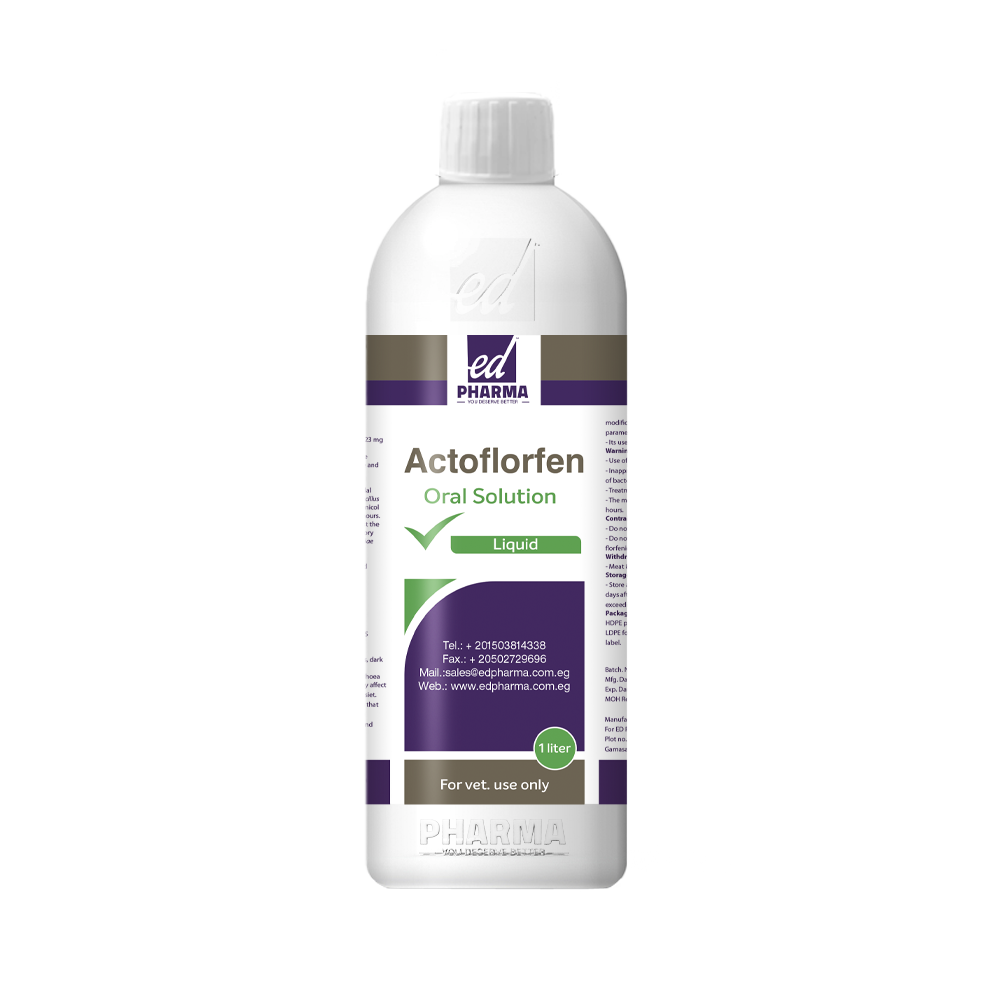ACTOFLORFEN
ACTOFLORFEN
ACTOFLORFEN
Oral solution
(For vet. use only)
ACTOFLORFEN
Each 1ml contains:
Florfenicol 23 mg.
Florfenicol 23 mg.
Florfenicol is a broad-spectrum synthetic antibiotic in the phenicol group that is active
against most Gram-positive and Gram-negative bacteria isolated from domestic animals.
Florfenicol acts by inhibition of protein synthesis at the ribosomal level and is bacteriostatic.
However, bactericidal activity has been demonstrated in-vitro against Actinobacillus pleuropneumoniae and Pasteurella multocida when florfenicol is present at concentrations above the MIC for up to 12 hours.
In-vitro testing has shown that florfenicol is active against the bacterial pathogens most commonly isolated in respiratory diseases in pigs, including Actinobacillus pleuropneumoniae and Pasteurella multocida.
Florfenicol acts by inhibition of protein synthesis at the ribosomal level and is bacteriostatic.
However, bactericidal activity has been demonstrated in-vitro against Actinobacillus pleuropneumoniae and Pasteurella multocida when florfenicol is present at concentrations above the MIC for up to 12 hours.
In-vitro testing has shown that florfenicol is active against the bacterial pathogens most commonly isolated in respiratory diseases in pigs, including Actinobacillus pleuropneumoniae and Pasteurella multocida.
Swine: Treatment of swine respiratory disease associated with Actinobacillus pleuropneumoniae and Pasteurella multocida susceptible to florfenicol.
Pigs.
Orally in drinking water
Dose:
0.44 ml of Actoflorfen per kg of body weight per day for 5 consecutive days.
Dose:
0.44 ml of Actoflorfen per kg of body weight per day for 5 consecutive days.
- A slight reduction of water consumption by the animals, dark brown faeces and constipation may be observed during treatment. Commonly observed adverse effects are diarrhoea and/or peri-anal and rectal erythema/oedema which may affect approximately 40% of the animals.
- These effects are transient.
- In a few of the affected animals prolapse of the rectum that resolves without treatment may be observed.
- In case of overdosing, a decrease in weight gain, food and water consumption, peri-anal erythema and edema and modification of some hematological and biochemical parameters indicative of dehydration may be observed.
- Its use is not recommended during gestation and lactation.
- These effects are transient.
- In a few of the affected animals prolapse of the rectum that resolves without treatment may be observed.
- In case of overdosing, a decrease in weight gain, food and water consumption, peri-anal erythema and edema and modification of some hematological and biochemical parameters indicative of dehydration may be observed.
- Its use is not recommended during gestation and lactation.
- Use of the product should be based on susceptibility testing.
- Inappropriate use of the product may increase the prevalence of bacteria resistant to florfenicol.
- Treatment should not exceed 5 days.
- The medicated drinking water should be replaced every 24 hours.
- Inappropriate use of the product may increase the prevalence of bacteria resistant to florfenicol.
- Treatment should not exceed 5 days.
- The medicated drinking water should be replaced every 24 hours.
- Do not use in boars intended for productive purposes.
- Do not administer in cases of previous allergic reactions to florfenicol.
- Do not administer in cases of previous allergic reactions to florfenicol.
Meat & Offal: 20 days.
Store at a temperature not exceeding 30°C and used for 30 days after opening to
be stored at a temperature not exceeding 30°C.
HDPE plastic bottles capped with (HDPE) plastic caps with internal LDPE foam linear,
filled with 100 ml, 250 ml, 500 ml and 1000 ml oral solution with an outer label.
